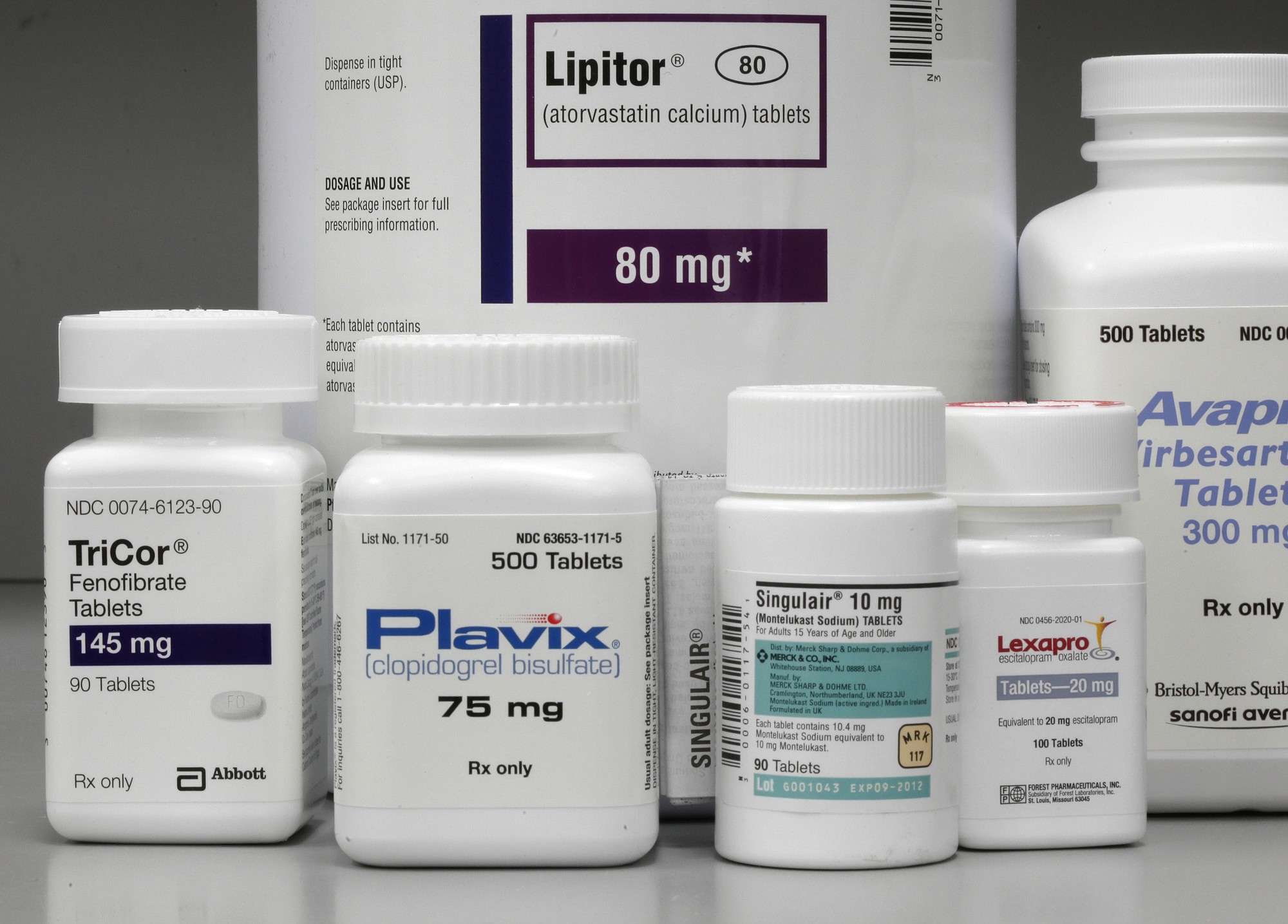The cost of prescription medicines used by millions of people every day is about to plummet.
The next 14 months will bring generic versions of seven of the world’s 20 best-selling drugs, including the top two: cholesterol fighter Lipitor and blood thinner Plavix.
The magnitude of this wave of expiring drugs patents is unprecedented. Between now and 2016, blockbusters with about $255 billion in global annual sales are set to go off patent, notes Evaluate-Pharma Ltd., a London research firm. Generic competition will decimate sales of the brand-name drugs and slash the cost to patients and companies that provide health benefits.
Top drugs getting generic competition by September 2012 are taken by millions every day: Lipitor alone is taken by about 4.3 million Americans and Plavix by 1.4 million. Generic versions of big-selling drugs for blood pressure, asthma, diabetes, depression, high triglycerides, HIV and bipolar disorder also are coming by then.
The flood of generics will continue for the next decade or so, as about 120 brand-name prescription drugs lose market exclusivity, according to prescription benefit manager Medco Health Solutions Inc.
“My estimation is at least 15 percent of the population is currently using one of the drugs whose patents will expire in 2011 or 2012,” says Joel Owerbach, chief pharmacy officer for Excellus Blue Cross Blue Shield, which serves most of upstate New York.
Those patients, along with businesses and taxpayers who help pay for prescription drugs through corporate and government prescription plans, collectively will save a small fortune. That’s because generic drugs typically cost 20 percent to 80 percent less than the brand names.
Doctors hope the lower prices will significantly reduce the number of people jeopardizing their health because they can’t afford medicines they need.
Dr. Nieca Goldberg, director of The Women’s Heart Program at NYU Langone Medical Center in Manhattan, worries about patients who are skipping checkups and halving pills to pare costs.
“You can pretty much tell by the numbers when I check the patient’s blood pressure or cholesterol levels,” that they’ve not taken their medications as often as prescribed, she says.
Even people with private insurance or Medicare aren’t filling all their prescriptions, studies show, particularly for cancer drugs with co-pays of hundreds of dollars or more.
The new generics will slice co-payments of those with insurance. For the uninsured, who have been paying full price, the savings will be much bigger.
Daly Powers, 25, an uninsured student who works two part-time jobs at low wages, says he often can’t afford the $220 a month for his depression and attention deficit disorder pills. He couldn’t buy either drug in June and says he’s struggling with his Spanish class and his emotions. He looks forward to his antidepressant, Lexapro, going generic early next year.
“It’d make all the difference in the world,” says Powers, of Bryan, Texas.
Generic medicines are chemically equivalent to the original brand-name drugs and work just as well for nearly all patients.
When a drug loses patent protection, often only one generic version is on sale for the first six months, so the price falls a little bit initially. Then, several other generic makers typically jump in, driving prices down dramatically.
Last year, the average generic prescription cost $72, versus $198 for the average brand-name drug, according to consulting firm Wolters Kluwer Pharma Solutions. Those figures average all prescriptions, from short-term to 90-day ones.
Average co-payments last year were $6 for generics, compared with $24 for brand-name drugs given preferred status by an insurer and $35 for nonpreferred brands, according to IMS Health.
Among the drugs that recently went off patent, Protonix, for severe heartburn, now costs just $16 a month for the generic, versus about $170 for the brand name. And of the top sellers that soon will have competition, Lipitor retails for about $150 a month, Plavix costs almost $200 a month and blood pressure drug Diovan costs about $125 a month. For those with drug coverage, their out-of-pocket costs for each of those drugs could drop below $10 a month.
For now, brand-name drugmakers are scrambling to adjust for the billions in revenue that will soon be lost. Many raise prices 20 percent or more over the last couple years before generics hit to maximize revenue. Some contract with generic drugmakers for “authorized generics,” which give the brand-name company a portion of the generic sales.
Brand-name companies also are trimming research budgets, partnering with other companies to share drug development costs and shifting more manufacturing and patient testing to low-cost countries.



